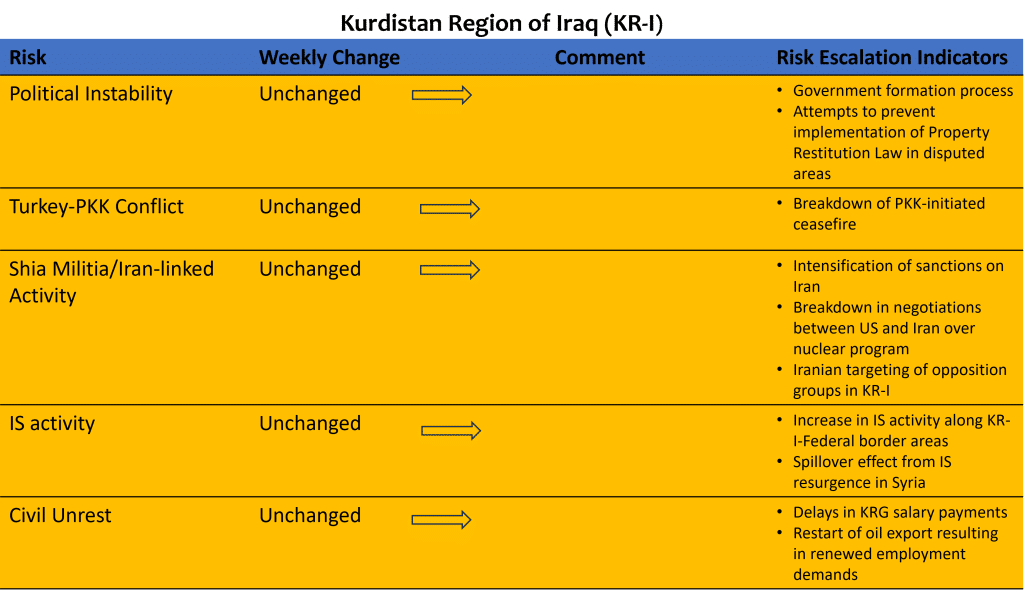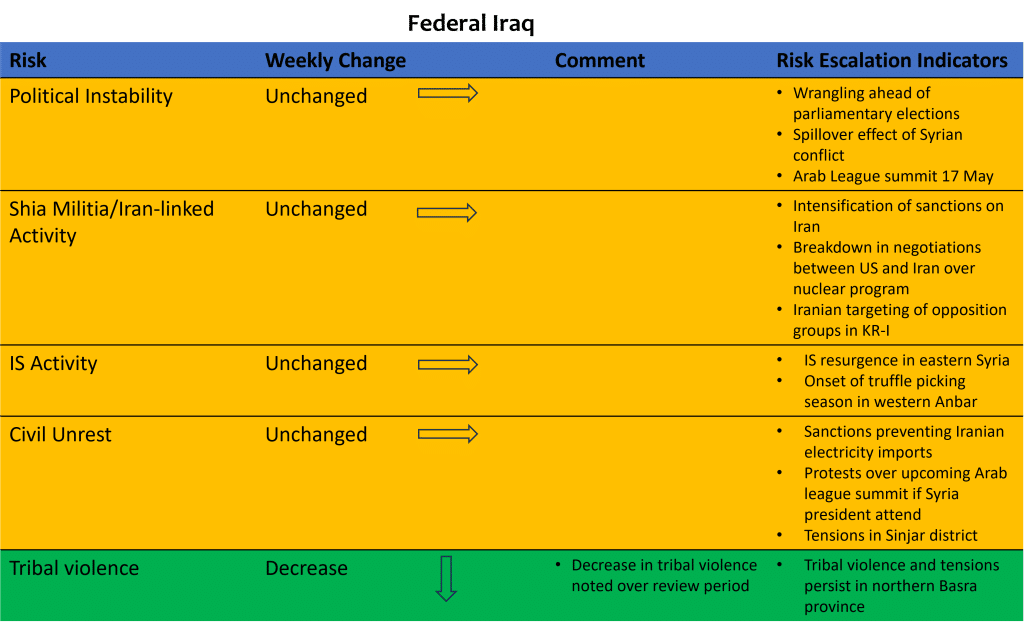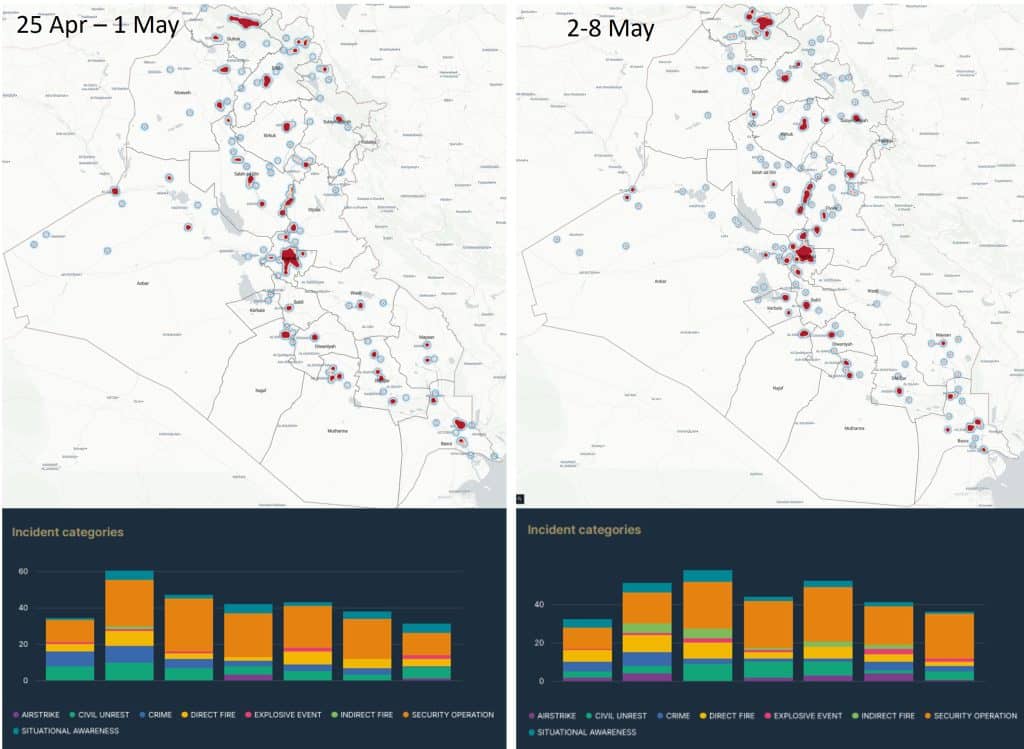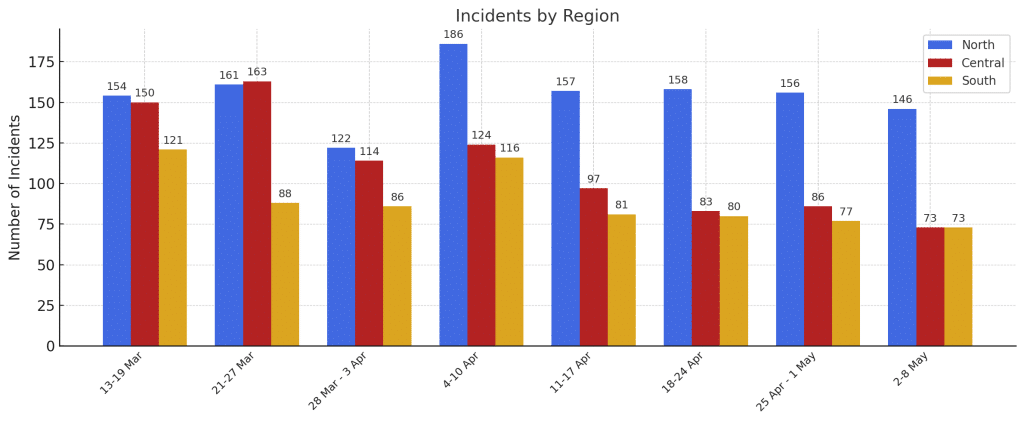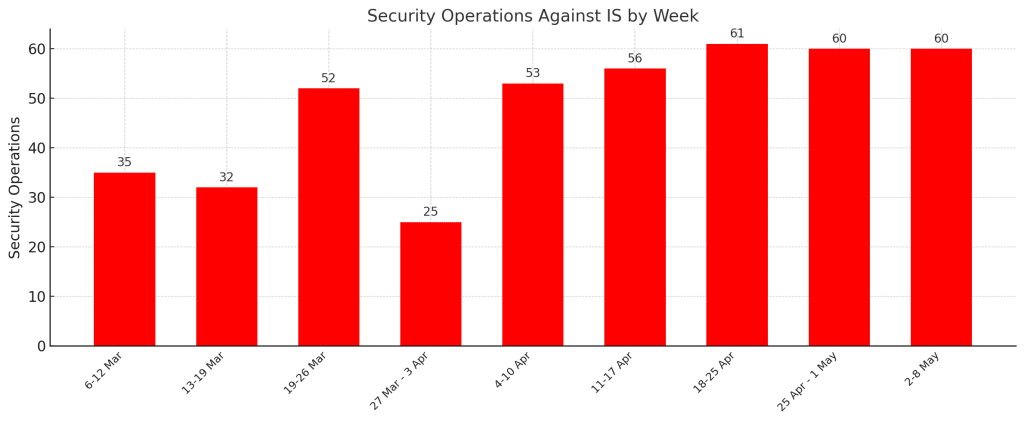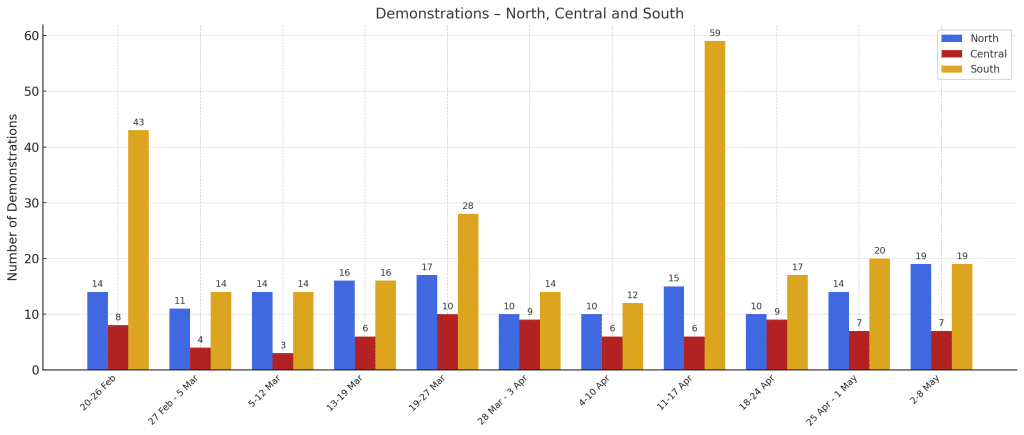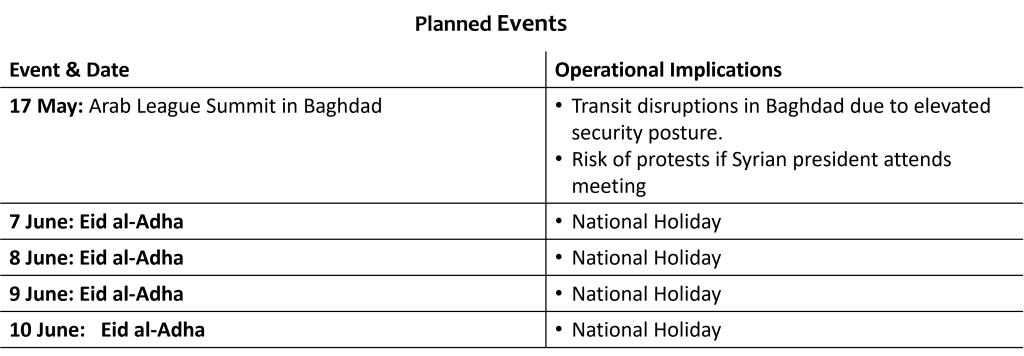Weekly Incident Map
Executive Summary
Escalation in regional tensions as Houthis strike Tel Aviv Airport
US and Houthi Movement announce ceasefire
Fourth round of nuclear negotiations postponed
Escalating discourse contrasts continued Turkish – PKK clashes
Clashes with IS cell in Tarmiyah – Persistent counter-IS ops across Iraq
Preparations ahead of Arab League summit in Baghdad
Syrian President’s participation in Arab League Summit unclear
Local and tribal violence across the south
Security operations in the south largely meant to deter local violence
Risk Levels, Risk Escalation Indicators & Planned Events
Escalation in regional tensions as Houthis strike Tel Aviv Airport
Hostilities between Israel and the Houthi Movement in Yemen escalated this week after the movement launched a strike against the Ben Guiron Airport – Israel’s only international airport – on 4 May. The ballistic missile reportedly impacted a parking lot in the vicinity, injuring at least eight individuals and forcing a temporary shutdown of airport operations. Israeli officials confirmed that the Arrow 3 interceptor missile suffered a technical error that prevented the successful interception of the ballistic missile, yet the attack underscores the Houthi Movement’s continued ability to employ sophisticated ballistic and UAV capabilities against well-protected targets in the region. In response, Israeli forces launched multiple airstrikes against strategic targets within Houthi-controlled areas of Yemen. This included power stations, UAV manufacturing facilities and other military sites deemed essential for Houthi military operations. Most notably, on 6 May, multiple airstrikes were conducted in and around Sana’a International Airport, destroying multiple aircraft and rendering the facility inoperable.

Images depicting impact near Ben Gurion Airport
The escalation continued on 7 May as the Houthi Movement claimed to have launched long-range UAV strikes against the Eilat Port in southern Israel as well as an unspecified military target within Israeli territory. Like the strike against Ben Gurion, the escalation forms part of a long-standing attempt by the Houthi Movement to disrupt Israeli trade and logistics routes, and to target the Israeli economy in retaliation for the operation in the Gaza Strip.
US and Houthi Movement announce ceasefire
The escalation between Israel and the Houthi Movement follows a ceasefire between the US and the Houthi Movement, declared earlier this week, following weeks of US airstrikes against targets inside Yemen. The US clarified that it was not involved in supporting the Israeli operations this week, while the Houthi Movement said the ceasefire with the US will not affect its continuing operations against Israel. Notably, President Donald Trump announced that the US would cease further airstrikes against the Houthi Movement. In exchange, the group pledged to stop attacks on maritime shipping targets in the Red Sea.

Houthi attacks and airstrikes 1 Jan 2025 – 8 May 2025
The circumstances of the agreement, which Oman mediated, remain somewhat unclear however since the Houthi Movement has not targeted shipping in the Red Sea since January this year. Moreover, the recent spate of US airstrikes commenced as a response to the breakdown of the Gaza Strip ceasefire and the Houthis’ associated threat to resume operations against Israel. Given the recent absence of attacks against shipping targets, and by clarifying that the Houthi Movement would continue attacks against Israel regardless of the US ceasefire, it is therefore unclear what practical concessions, if any, the Houthi Movement made in return for a pause in US strikes.
Regardless, the tit-for-tat strikes between the Houthis and Israel can be expected to continue over the coming weeks, contributing to an increase in regional tensions and, by extension, Israeli-Iranian hostilities. So far, these dynamics are not assessed to impact the security environment in Iraq, which is generally unaffected by developments in Yemen and the Red Sea, yet related dynamics will be important to monitor in terms of broader regional tensions.
Fourth round of nuclear negotiations postponed
The negotiations between Iran and the US showed no signs of progress this week as the two sides maintain firm positions on key matters. Most importantly, the fourth round of negotiations, planned to be held in Rome on 3 May, was postponed for unclear reasons. Omani sources cited by international media attributed the delay to “logistical reasons” however multiple reports suggested Iranian officials reacted negatively to the imposition of additional US sanctions and continuing threats by US officials. To recall, the Iranian government has rejected direct talks with the US side under “pressure from military action,” and speculative reporting claimed senior Iranian officials were provoked by a recent tweet by US Defence Secretary Pete Hegseth that threatened military action in response to Iran’s support for the Houthi Movement. Last week, the US also announced additional sanctions on Iran – a move likely meant to increase pressure ahead of the negotiations but that may have pushed Iran to postpone the talks instead.
Meanwhile, key disagreements underpinning the negotiations are assessed to remain. Further to the Trump administration’s call to include other regional issues in the talks, including the ballistic missile program, President Trump stated this week that the US will insist on a full dismantling of Iran’s nuclear program, taking a firm position that could hinder progress in upcoming negotiations. This declaration clarifies an ongoing debate within his administration, where some advisors argue for a complete end to Iran’s nuclear activities, while others support limited uranium enrichment to reduce the risk of conflict. Iran has repeatedly refused to fully dismantle its program, emphasizing both publicly and privately that such a demand is unacceptable. The next round of the talks remains to be confirmed, but media reports on 8 May stated that it is likely to be held on 11 May. This remains unconfirmed and as of writing, no date has been set.
Escalating discourse contrasts continued Turkish – PKK clashes
During the reporting period, senior Turkish officials, including AKP spokesperson Ömer Çelik, publicly signaled expectations that the Kurdistan Workers’ Party (PKK) would imminently disband and disarm, referring to the process as expected to “materialize within days.” These remarks followed internal party deliberations chaired by President Recep Tayyip Erdoğan and echoed earlier statements encouraging implementation of Abdullah Öcalan’s February call for peaceful dissolution. Despite this, the PKK has yet to convene a formal conference to address the call. On the ground, hostilities between Turkish forces and the PKK persisted across northern Iraq, suggesting that strategic-level messaging has not yet translated into a meaningful de-escalation of the conflict.

Overview Turkey-PKK activity 2-8 May
PKK elements claimed multiple attacks against Turkish military positions throughout Duhok province, including kamikaze drone strikes on 1 and 3 May targeting radar systems, tunnel infrastructure, and a DShK machine gun position on Bahar and Amedi Hills. On 5 May, PKK media reported two additional drone attacks. The group also stated it carried out 17 attacks in April, destroying or damaging various Turkish military assets and causing limited Turkish casualties. However, these claims remain unverified. PKK-linked media later published footage of an assessed explosives-laden quadcopter attack against a Turkish position, reportedly resulting in the death of a Turkish soldier. Separately, Turkish authorities confirmed that Staff Sergeant Önder Ozen died from wounds sustained in a PKK-claimed IED blast in the Hakurk region. Clashes were also reported near Blava village in Derluk sub-district, with subsequent armed encounters and explosions observed on 7 May in Zap and Derluk.
Turkey intensified its military operations during the same period, particularly around Metina, Amedi, and the Qandil Mountains. Turkish aircraft reportedly carried out airstrikes in Qandil on 1 May, followed by an artillery strike near civilian areas in Barchi village, Amedi district, on 2 May. Despite the proximity of the bombardment to a public celebration, no casualties were reported. Turkish forces also located and cleared multiple PKK caves in Duhok province, seizing weapons and supplies. Turkish military operations included aerial strikes against assessed PKK elements in northern Duhok’s Zap area, with additional airstrikes targeting Gara Mountain on 8 May. Casualty and damage figures from the strikes have not been disclosed. Over a three-day span, PKK sources alleged that Turkish forces launched over a thousand artillery shells and five airstrikes across northern Erbil and Duhok.
PKK-linked sources further claimed that Turkish forces carried out 765 artillery strikes between 5 and 7 May, impacting areas of Zap, Amedi Hill, Metina, and Bahar Hill. Turkish cave-clearing operations continued but reportedly drew small arms and sniper fire from PKK elements in Metina and Dergele. While Turkish operations remain concentrated in northern Duhok, pro-Iranian media claimed Turkey has now deployed over 136 military outposts in the region, further underscoring the entrenched nature of the campaign.
Clashes with IS cell in Tarmiyah – Persistent counter-IS ops across Iraq
On 4 May, a significant clash occurred between Popular Mobilization Forces (PMF) personnel and Islamic State (IS) militants in the Tarmiyah district, northern Baghdad province. According to the North Baghdad PMF Brigade, the exchange of fire resulted in the deaths of three IS fighters and injuries to one PMF member. Tarmiyah remains a known hotspot for IS-linked activity and is assessed to host sympathetic networks, prompting concern over future attacks and expected increases in security force presence.
Joint security operations targeting IS support networks continued across federal Iraq and the Kurdistan Region, with notable coordination between the Federal Ministry of Defense and the Asayish General Directorate. Between 29 April and 6 May, forces conducted raids across the Sulaymaniyah-Kirkuk-Diyala border region, resulting in the arrest of six IS operatives and the destruction of multiple hideouts. Earlier in the week, a key IS facilitator was apprehended in Kirkuk for coordinating the movement of fighters between Daquq and Kirkuk. Additionally, on 6 May, the 30th PMF Brigade arrested a suspect linked to IS in the Nineveh Plain. These actions reflect sustained intelligence-led targeting of IS enablers operating in urban centers and rural peripheries.
Meanwhile, wide-ranging counter-IS operations remained active in rural zones across Salah ad Din, Kirkuk, Nineveh, and Anbar provinces. Security forces recovered legacy IS munitions in multiple locations, including Tal Gusaybah, Baiji, and along the Adhaim River. The PMF also destroyed IS tunnel infrastructure in al-Qaim, uncovered weapon stockpiles on Albu Marsus Island, and neutralized multiple explosive devices in Karma and Tharthar. In the Dibis district, a PMF unit cleared an IS hideout on Kubaila Mountain containing RPGs and IEDs. Despite deteriorating weather in some areas, operations continued, notably in Riyadh sub-district and the Hamrin Mountain region. These efforts reflect a continued emphasis on containing IS remnants and preventing their reconstitution in contested terrain.
Preparations ahead of Arab League summit in Baghdad
The security environment in Baghdad city was largely unchanged over the week, with incidents and developments consistent with standing trends. Peaceful protests continued to be reported outside government ministries in the central districts of Rusafa and Karkh, with no major impact on security conditions assessed. These included gatherings by university graduates demanding employment and government employees demanding improved employment conditions. Like most demonstrations in the city, these remain focused on local issues and are not assessed to pose a direct threat to foreign operations in the city. Other hostilities were limited and a reduction in violence was noted overall. This included low-level incidents involving small arms fire and criminality reported in the outer districts of eastern Baghdad which are associated with high levels of social violence and criminality. While caution is advised in these areas, given the potential for bystander casualties, this is typically not directed against foreign nationals or operations.
Aside from dust storms affecting parts of the central and southern regions over the week, the reduction in activity may also be attributed to enhanced security measures ahead of the Arab League summit on 17 May, as preparations continue to ensure the safety and security of the visit. Commenting on the preparations this week, Prime Minister Sudani affirmed that the successful organization of the event would represent a political and security victory for Iraq. A spokesperson for the Supreme Security Committee this week also said that the authorities reinforced security at Baghdad Airport ahead of the event, while a “dedicated security force” will be deployed to protect key hotels and access routes. Client operations should anticipate an elevated security posture in the city ahead of and during the summit, focusing on the airport, airport road and the central districts of Baghdad.
Syrian President’s participation in Arab League Summit unclear
The heightened security measures come in the wake of political controversy sparked last month, when an invitation was extended to Syrian Interim President Ahmed al-Sharaa to attend the Arab League Summit. The move drew criticism and political outrage, primarily from pro-Iranian factions, due to al-Sharaa’s past links with al Qaeda in Iraq. President al-Sharaa’s presentation remains uncertain however and this week, Interior Minister Abdul Amir Al-Shammari said that the Syrian government has still to accept the invitation, and noted that Damascus has not communicated with Baghdad on the matter. Al-Shammari struck a somewhat critical tone and said there was “no security coordination” with the Damascus government regarding the summit, nor other important issues like border security or border crossings. Earlier this week, some Iraqi media sources also stated that al-Sharaa is seeking US security guarantees to attend the summit. An Iraqi media source said the president is requesting protection from a “US-based private security firm” as a condition for the visit, citing fears of potential assassination.
While an official request to obtain security protection has not been confirmed, these latest remarks do raise questions about al-Sharaa’s attendance, which, if it proceeds, would risk generating additional political reactions, demonstrations and even the threat of violence in the capital. Related dynamics will therefore be monitored closely ahead of the event.
Local and tribal violence across the south
Localized violence continued across southern Iraq, driven by tribal disputes, criminal acts, and interpersonal conflicts. In Basra province, a retired brigadier general was killed and five others wounded during an armed altercation in Yasin Khribit, while an ambush in Midaina resulted in the targeted killing of a police officer in a suspected tribal revenge incident. Northern Basra also witnessed heavy gunfire near a school in Nahr al-Ezz and a separate arson incident in Suwayb linked to a local dispute. In Maysan, one person was killed during tribal violence in Qal’at Saleh, and a poet was shot and wounded in Haji Abd due to a personal feud. Diwaniyah reported several incidents, including a fatal stabbing following a personal dispute, a high-value gold shop robbery in Hamza al-Sharqi, and a gunfight in Mannar, Dhi Qar, that left one dead. Clashes in Albu Salih village in Muthanna province injured 13 individuals, including police personnel, and culminated in weapon seizures. Other notable violence included an armed attack on a bus carrying pilgrims along the Najaf-Maysan highway and a knife fight in Basra tied to a football-related dispute.
Demonstrations in the south
Demonstrations were widespread and centered on employment, public services, and infrastructure grievances. In Najaf, multiple protests occurred, including administrative graduates demanding secure government jobs and landowners opposing real estate transfers. In Basra, large gatherings in Midaina and Umm Qasr called attention to worsening water access, with the latter opposing plans to redirect desalinated water to Safwan. Similar service-based protests occurred in Muthanna, Babil, and Karbala, including farmers in Ain al-Tamur objecting to wheat transport restrictions and Dawaya residents in Dhi Qar demanding officials’ resignations over water shortages. Diwaniyah witnessed a full power outage after generator owners went on strike, while Al Abs Tribe members in Wasit threatened a sit-in over electricity distribution. Additional events included pay-related protests in Babil and Muthanna and a sectarian-tinged demonstration in Basra’s Safwan district opposing a local school principal.
Security operations in the south largely meant to deter local violence
Security forces sustained a high operational tempo, responding to violent incidents and conducting preventive operations across southern Iraq. In Najaf and Kufa, police arrested individuals involved in firearm and assault incidents, while Maysan police prevented a kidnapping and arrested the suspect on the scene. The 83rd Iraqi Army Commando Brigade carried out targeted raids in Kahla and Uzair districts, resulting in arrests and ammunition seizures. In Babil, both fugitives who escaped Hillah Reform Prison were apprehended within 24 hours. In Basra, authorities launched counter-smuggling operations in Khor al-Zubayr and foiled an arms smuggling attempt at North Umm Qasr Port, seizing over 3,200 rifles. National operations led by the Ministry of Defense resulted in arrests of drug traffickers and seizure of narcotics in multiple provinces. Meanwhile, local coordination meetings took place in Zubayr ahead of the Basra Provincial Council’s first session, highlighting official efforts to manage local governance and maintain stability amid persistent unrest.
Risk Levels, Risk Escalation Indicators & Planned Events
